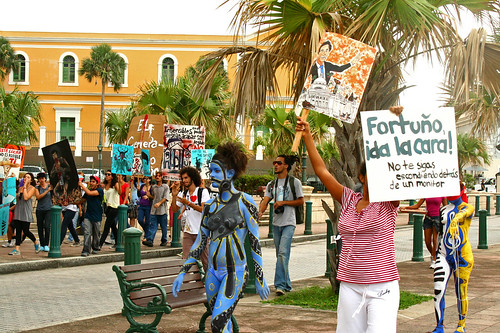“Why Washington Won’t Allow Democracy in Haiti” and other links…
Mark Weisbrot via Imani Perry: “People who do not understand U.S. foreign policy think that control over Haiti does not matter to Washington, because it is so poor and has no strategic minerals or resources. But that is not how Washington operates, as the Wikileaks cables repeatedly illustrate. For the State Department and its allies, it is all a ruthless chess game, and the pawns matter. Left governments will be removed or prevented from taking power where it is possible to do so; and the poorest countries – like Honduras last year – present the most opportune targets. A democratically elected government in Haiti, due to its history and the consciousness of the population, will inevitably be a left government – and one that will not line up with Washington's foreign policy priorities for the region. Hence, democracy is not allowed.”
“Cuban medics in Haiti put the world to shame”
Nina Lakhani via Miguel de Icaza: “Observers of the Haiti earthquake could be forgiven for thinking international aid agencies were alone in tackling the devastation that killed 250,000 people and left nearly 1.5 million homeless. In fact, Cuban healthcare workers have been in Haiti since 1998, so when the earthquake struck the 350-strong team jumped into action. And amid the fanfare and publicity surrounding the arrival of help from the US and the UK, hundreds more Cuban doctors, nurses and therapists arrived with barely a mention.”
“The Next Katrina? California’s Looming Levee Catastrophe”
Jenara Nerenberg: “The levees were built mostly by the Chinese in the mid-1800s and haven't been attended to as well as they should mainly due to rivaling, fractious groups spread throughout the state. The majority of organized groups see the danger--much like climate change--as imminent and real, but some are unconcerned and just want to leave the levees alone. With severe budget deficits like the state currently has, scaring up cash for long-term planning can be painful and difficult. (Getting an exact figure on current repair costs is tricky--one estimate puts the price tag at $750 million; another has it jacked up to $53 billion.)”
“Protests and Arrests Continue at the University of Puerto Rico”
Maegan La Mala: “Yesterday marked the second day of coordinated civil disobedience at the University of Puerto Rico in Rio Piedras as part of a strike that protests an $800 fee that some say is aimed at making the constitutional protected right to education in Puerto Rico a privilege.”

